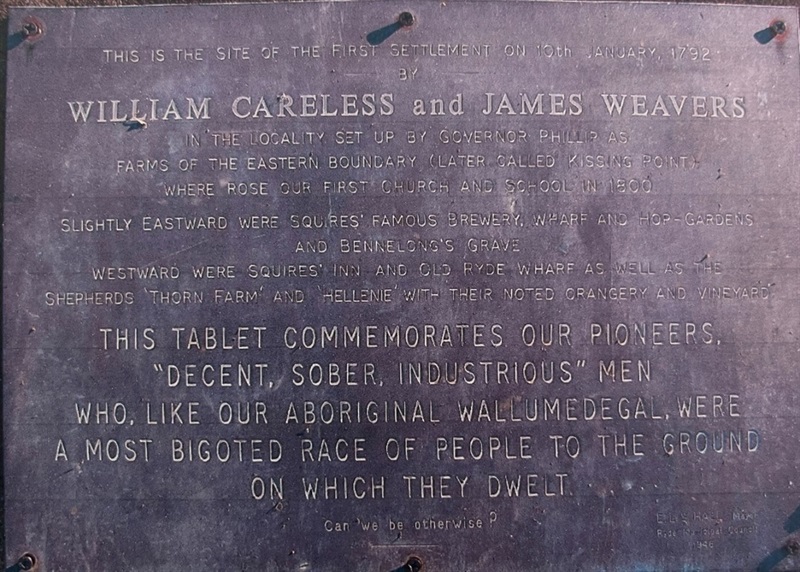Careless Weavers Plaque
On Friday 25 June 1948 Alderman Michael Levy unveiled a plaque, set in rock, in Settlers Park, Putney.
News Articles
The Weekly Times | 1 July 1948
The Weekly Times reported on the event, especially the stories of the pioneers, their descendants and Ryde Council’s ‘policy of preserving and marking historic spots’. View the news article(JPG, 554KB).
The curious wording on this plaque, especially concerning the pioneers and Aboriginal Wallumedegal being “a most bigoted race of people to the ground” on which they dwelt, was addressed in a newspaper article in the Daily Telegraph published two days after the plaque’s unveiling.
The Daily Telegraph | 27 June 1948
Most suburban councils are more interested in dog licences than history. Ryde is an exception.
On Friday Alderman Levy, author of a just-published History of Ryde, unveiled a tablet set in the rock on the exact site of Ryde’s first settlement – between Ryde Bridge and Halvorsen’s boatshed – made in 1792.
The inscription reads:
THIS TABLET COMMEMORATES OUR PIONEERS – “DECENT, SOBER, INDUSTRIOUS” MEN WHO LIKE OUR ABORIGINAL WALLUMEDEGAL, WERE “A MOST BIGOTED RACE OF PEOPLE TO THE GROUND” ON WHICH THEY DWELT.
Alderman Levy explains:
Wallumedegal was the aboriginal tribe which inhabited what is now Ryde. The Rev Samuel Marsden, in an official report, described them as “decent, sober and industrious.”
The second quotation, with its curious use of the word “bigoted,” comes from a letter written by Rev W Walker, a Wesleyan missionary.
It refers to the Wallumedegals’ strong tie to their land, to which they always returned before they died.
The word should be spelled “bigotted” Mr Levy says.
Michael Levy, had, as the article referred to, published a history of Ryde called Wallumetta: a history of Ryde and its district 1792-1945. On its title page he referred to himself as an Alderman of Ryde Municipal Council and as Late Lecturer, Department of Tutorial Classes, University of Sydney. Levy had been elected at the triennial election on 6 December 1941 and served 1942-1944. He was re-elected at the triennial election of 2 December 1944 and served 1945-1948.
The author of the Daily Telegraph article thought the use of the word ‘bigoted’ to be curious but, as Levy explained, it came from a letter of a Wesleyan missionary and referred to the Wallumedegals’ ‘strong tie to their land’.
The ’Walker letter’ was written by the Rev. William Walker to Rev. Richard Watson on 15 November 1821. The original letter was transcribed by James Bonwick and the transcript is part of the Bonwick Transcripts Box 52, in the Mitchell Library, State Library of New South Wales.
James Bonwick and the Bonwick Transcripts from the Mitchell Library catalogue
James Bonwick (1817-1906) began examining historical records of Australian interest in London in 1884, and in 1887 he was authorised by the New South Wales Colonial Secretary, Sir Henry Parkes, to transcribe Governors’ despatches he had discovered. In 1888 he was appointed Archivist and until 1902 continued to compile what became known as the Bonwick Transcripts. These handwritten transcripts of records, mainly from the British Colonial Office in the Public Records Office, NSW Colonial Secretary’s office in Sydney, and from some in private hands, were used in the Historical Records of New South Wales (1892-1901) and Historical Records of Australia (1914-1926).
From Bonwick Transcripts Box 52, ML; location of original letter unknown
Differences between the text on the plaque and in the letter
The plaque stated:
“a most bigoted race of people to the ground” on which they dwelt
The letter stated:
a most bigotted race of people to the ground on which they were born
It is unknown why the text on the plaque was not the same as the text in the letter or indeed why the spelling of bigotted was changed.
Replacement of the plaque

At some date, the plaque was replaced and re-located, most likely to its current position. The replacement plaque still carries the original date of 1948 and the name of the then mayor, E L S Hall. There is no indication that it is a replacement plaque or why it was replaced, but the photograph of the original plaque proves it to be the case.
One major and important change was made on the replacement plaque: the quotation marks were removed from the phrase a most bigoted race of people to the ground, so it no longer reads as a quote but more as a commentary or an opinion.
In the 2002 publication by the Ryde District Historical Society called Historic Ryde: a guide to some significant heritage sites in the City of Ryde edited by Kevin Shaw, the chapter on Settler’s Park written by long time Society member Eve Trevitt also addressed the issue of the use of the word bigoted.
In 1948, a plaque was placed here by Ryde Municipal Council at the request of descendants of these early pioneers and demonstrates the changing nature of the English language. The term “bigoted” would refer to its literal meaning which was in use in those days – meaning an “obstinate and intolerant adherence of a creed or view”, possibly referring to the settler’s belief in the value of their pioneering settlement.
Prepared by Angela Phippen, Local Studies and Family History Librarian, City of Ryde, July 2023